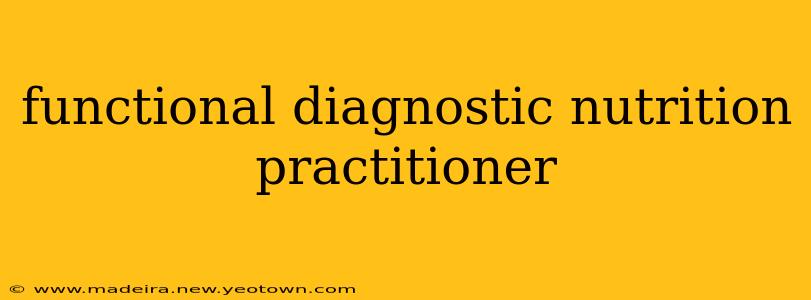Have you ever felt like your body is betraying you? Experiencing persistent fatigue, digestive issues, or brain fog despite following a healthy lifestyle and seeing numerous doctors? You're not alone. Many people find themselves on a frustrating journey, bouncing from specialist to specialist without ever uncovering the root cause of their health problems. This is where a Functional Diagnostic Nutrition (FDN) practitioner can make all the difference.
This isn't your typical doctor's visit. An FDN practitioner takes a deeply personalized approach, going beyond symptom management to identify the underlying imbalances that contribute to chronic illness. They delve into your lifestyle, environment, and genetics to create a comprehensive picture of your health. It's like being a detective, piecing together clues to solve the mystery of your unwellness.
What Does a Functional Diagnostic Nutrition Practitioner Do?
FDN practitioners utilize advanced functional lab testing to uncover hidden imbalances. They don't just rely on standard blood tests; instead, they often incorporate tests that assess gut health, hormone levels, nutrient deficiencies, and inflammation markers. This detailed analysis allows them to build a unique plan tailored to your body's specific needs.
Think of it this way: traditional medicine often focuses on treating symptoms with medication. FDN practitioners, however, strive to address the root cause of the symptoms, often through dietary and lifestyle modifications. They view the body as an interconnected system, where problems in one area can cascade and affect others.
What Kind of Tests Do FDN Practitioners Use?
This is a question often asked by those considering this path to wellness. The tests used vary depending on the individual's needs and presenting symptoms, but may include:
- Comprehensive Stool Analysis: This goes beyond a simple fecal test, analyzing the gut microbiome to identify imbalances and potential infections.
- Organic Acid Testing (OAT): This provides insight into metabolic function, identifying potential deficiencies and revealing how well your body is processing nutrients.
- Hormone Testing (Saliva, Urine, Blood): Measures hormone levels to identify imbalances that could contribute to a wide range of symptoms, including fatigue, weight gain, and mood swings.
- Food Sensitivity Testing: This helps identify foods that may be triggering inflammation or other reactions, allowing for personalized dietary adjustments.
- Nutrient Deficiency Testing: Pinpoints deficiencies in essential vitamins and minerals, guiding supplementation strategies.
How Does Functional Diagnostic Nutrition Differ From Traditional Medicine?
The core difference lies in the approach. Traditional medicine focuses primarily on symptom management, often utilizing medication to alleviate symptoms. FDN practitioners, on the other hand, seek to understand the underlying causes of illness, empowering individuals to take control of their health through lifestyle modifications.
They work collaboratively with their patients, acting as guides and educators rather than simply prescribing treatments. This holistic approach encourages long-term well-being and empowers individuals to become proactive in managing their health.
Is Functional Diagnostic Nutrition Right for Me?
FDN might be a good fit if you've experienced:
- Persistent symptoms: Despite seeing multiple doctors, you haven't found relief for your symptoms.
- Chronic conditions: You're struggling with ongoing health challenges, such as fatigue, digestive issues, or autoimmune diseases.
- A desire for a holistic approach: You're seeking a personalized plan that addresses the root cause of your health concerns.
- Limited success with conventional medicine: You’re looking for alternatives to medication-based treatments.
What Can I Expect During an FDN Consultation?
Your initial consultation will involve a thorough review of your medical history, lifestyle, and diet. Your practitioner will ask detailed questions about your symptoms, family history, and environmental exposures. This information, combined with functional lab testing, will help them to develop a personalized plan that may include:
- Nutritional recommendations: Tailored dietary changes designed to support your body's healing process.
- Lifestyle adjustments: Suggestions for improving sleep, stress management, and exercise habits.
- Supplementation strategies: Recommendations for targeted supplements to address specific deficiencies.
Remember, Functional Diagnostic Nutrition is not a quick fix. It's an investment in your long-term health, requiring commitment and collaboration with your practitioner. But for many, the journey is worth it – leading to lasting improvements in energy levels, digestion, mental clarity, and overall well-being. It's about empowering you to take charge of your health and discover the vibrant, energetic life you deserve.

